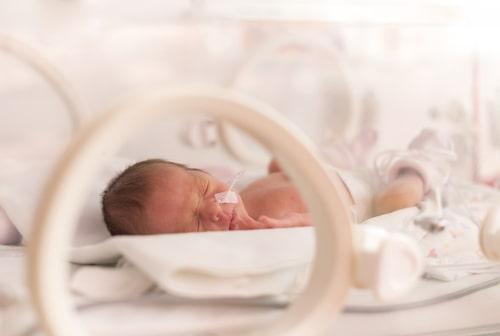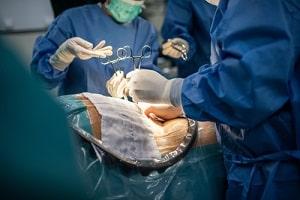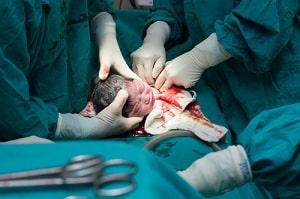Chicago, IL 60601
FREE CONSULTATIONS 312-462-4200
TOLL FREE 833-462-4200
Recent Blog Posts
How Do I Know If Medical Mistakes Led to My Baby Being Born Prematurely?
 Premature birth, or birth before 37 weeks gestation, is associated with a range of medical concerns. A baby who is born too early may experience patent ductus arteriosus (PDA), low blood pressure, breathing problems, intraventricular hemorrhage, and other life-threatening medical problems shortly after birth. Premature babies may grow up suffering from intellectual disabilities, vision and hearing problems, cerebral palsy, and more. Sadly, some premature babies die during infancy. If your baby was born premature, you may question whether medical mistakes are to blame.
Premature birth, or birth before 37 weeks gestation, is associated with a range of medical concerns. A baby who is born too early may experience patent ductus arteriosus (PDA), low blood pressure, breathing problems, intraventricular hemorrhage, and other life-threatening medical problems shortly after birth. Premature babies may grow up suffering from intellectual disabilities, vision and hearing problems, cerebral palsy, and more. Sadly, some premature babies die during infancy. If your baby was born premature, you may question whether medical mistakes are to blame.
Risk Factors that Increase the Chances of Premature Birth
Understanding why a baby is born prematurely is often extremely difficult. Countless factors influence the health and growth of a fetus. However, researchers have identified certain risk factors that make premature birth more likely. These factors include:
- Maternal infections
Fetal Macrosomia: Potential Complications in Labor and Delivery
 Most babies weigh between six to nine pounds at birth. While many people are aware of the risks premature and underweight babies face, fewer are aware of the risks associated with larger-than-average babies. “Fetal macrosomia” refers to an infant that weighs more than 8 pounds, 13 ounces. Fetal macrosomia occurs in just under 10 percent of newborns. While many babies with fetal macrosomia are born healthy, high fetal weight can increase the risks of birth injuries such as shoulder dystocia.
Most babies weigh between six to nine pounds at birth. While many people are aware of the risks premature and underweight babies face, fewer are aware of the risks associated with larger-than-average babies. “Fetal macrosomia” refers to an infant that weighs more than 8 pounds, 13 ounces. Fetal macrosomia occurs in just under 10 percent of newborns. While many babies with fetal macrosomia are born healthy, high fetal weight can increase the risks of birth injuries such as shoulder dystocia.
Potential Consequences of Fetal Macrosomia
Babies that meet the criteria for fetal macrosomia increase the chances of complications during labor and delivery. One of the primary concerns for large babies is the risk of shoulder dystocia. This condition occurs when the baby becomes lodged on the mother’s pelvis during delivery. The infant’s head is delivered, but his or her shoulders are too large to fit through the mother’s pubic bone. This potentially life-threatening condition must be immediately addressed. Shoulder dystocia may deprive the baby of oxygen which can cause brain damage in a matter of minutes. The condition may also place so much pressure on the baby’s neck and shoulders that the baby’s brachial plexus nerves are damaged.
Medication Mistakes During Labor and Delivery Can Cause Birth Injuries

Childbirth used to be extremely painful and had a high chance of infant or maternal death. Medications have made childbirth much safer for women in the western world. Unfortunately, the medications used to make childbirth easier and safer are sometimes the same medications that can cause preventable birth injuries. Incorrect administration, inaccurate dosing, and other medication mistakes can cause severe harm to infants and mothers.
Prescribing or Administering a Medication During Pregnancy That Harms the Baby
Women who are pregnant must be very careful of what they put in their bodies. While most people think of illicit drugs when they think of drugs that can harm an unborn child, prescription medications can also cause birth injuries or even fetal death. Many SSRI medications designed to treat depression such as Zoloft and Prozac are very dangerous to unborn children. Persistent pulmonary hypertension, cleft palate, and Spina Bifida are just some of the birth defects that may be caused by certain antidepression medications. Some antibiotic medications, acne medications, and seizure medications like Lamictal and Tegretol may also cause birth defects. Doctors who prescribe or administer these medications to pregnant women may be liable if the baby suffers a birth defect.
Was My Infant’s Spinal Cord Injury Caused by Medical Malpractice?

Our spinal cords serve numerous vital functions. Consequently, damage to the spinal cord before or during an infant’s birth can have profound consequences. Babies who sustain a spinal cord injury during birth may suffer from paralysis, difficulty breathing, digestion issues, and more. The infant may require extensive medical intervention to recover from the spinal cord damage or he or she may be disabled for the rest of his or her life. There are many different reasons that an infant may suffer a spinal cord injury. In some cases, a spinal cord injury is caused by negligent medical care during a child’s birth.
Trauma During Birth May Damage a Baby’s Spinal Cord
Often, spinal cord injuries during birth occur because there is an urgent need to deliver the baby so birth assistive tools are used. For example, if the baby is not receiving enough blood flow to the brain, doctors may need to manually assist labor using forceps or vacuum extraction. When used correctly, birth-assistive tools can save an infant’s life. However, misuse of these tools or using assistive tools with an alternative birthing method can lead to preventable birth injuries. Force applied manually or via assistive tools, external cephalic version, and excessive traction may cause the baby’s spinal cord to become bruised or torn.
CDC Reports the Expected Lifetime Cost of Cerebral Palsy is $1 Million

Little can prepare a parent for the news that their child suffers from a disability like cerebral palsy. In addition to the grief, shock, and anger a parent may understandably feel, they must also contend with the massive financial impact the disability can cause. In one study, it was estimated that the costs associated with a cerebral palsy diagnosis total approximately $1 million. If your child is suffering from cerebral palsy caused by substandard medical care, it is important to know your options for seeking restitution.
Medical and Educational Expenses for a Child with Cerebral Palsy
A 2004 study published by the Centers for Disease Control and Prevention (CDC) investigated the direct and indirect costs of a child developing cerebral palsy. The study was, and still is, one of the most comprehensive evaluations of its kind. Researchers found that the average lifetime cost of cerebral palsy per person totaled approximately $921,000 in 2003 dollars. Adjusted for inflation, that equates to $1,326,128 in 2021. It is important to note that this estimate does not include the financial losses suffered by caregivers due to lost income and productivity and other out-of-pocket expenses.
What Birth Injuries May Be Caused by a Delayed C-Section?

Approximately 30 percent of babies born in the United States are born via cesarean section or C-section. Some mothers plan a C-section in advance for personal reasons or health concerns. Others are forced to deliver their baby through an emergency C-section because medical complications make a vaginal birth too dangerous. One of the most crucial responsibilities obstetricians and other medical staff have is to recognize when unplanned or emergency C-sections are needed to protect the health of the mother or the baby. Delayed C-sections or proceeding with vaginal birth when a C-section is safer can lead to preventable birth injuries.
Failure to Provide a Timely C-Section
Like all doctors, obstetricians have a legal obligation to provide reasonably skilled medical treatment to expectant mothers. This includes carefully weighing the risks associated with vaginal birth versus cesarean delivery on a case-by-case basis. A mother may require an emergency C-section if labor is prolonged, the baby is in a breech position, problems with the umbilical cord or placenta cuts off the baby’s blood supply, or other medical complications arise. If a mother requires an emergency C-section, the procedure must be carried out quickly. If a doctor waits too long to perform a C-section or fails to perform a necessary C-section, the baby or the mother could be left with lasting injuries.
What Types of Injuries Can Occur During a C-Section Delivery?

Births take place every day in hospitals throughout the United States, and doctors, nurses, and other medical personnel are trained and equipped to address complications and perform procedures to ensure that children are delivered safely. Cesarean deliveries are commonly performed if there are problems that would make a vaginal delivery unsafe, and in some cases, emergency C-sections are necessary to prevent birth injuries to children. Since a C-section is a surgical procedure, there are a variety of complications that can occur, and in addition to issues that may affect the health of a child, there is also a risk of life-threatening maternal injuries.
Injuries to Infants in a Cesarean Delivery
While C-sections can usually be performed without putting a child at risk, some injuries may still occur. The most common injuries involve lacerations in which a child is cut by surgical tools during the procedure. While these types of injuries are usually minor, in some cases, they could lead to serious blood loss or nerve damage. If children are delivered before 39 weeks, they are at higher risk of injuries such as broken bones, skull fractures, or brachial plexus injuries. Following a C-section, some newborns will experience breathing issues or excessive fluid in the lungs.
Are Pregnant Women at Higher Risk of Death During the COVID-19 Crisis?

For the past year, people throughout the United States have been concerned about the risks of COVID-19, and as the virus continues to affect everyone’s daily lives, most people are taking precautions to minimize the risks of infection. Those who do become infected may be able to receive the treatment necessary to recover, but the chances of death continue to be high. This is a major concern for pregnant mothers since they will want to protect their child’s health in addition to their own. Unfortunately, the rate of maternal death in the United States, which is already significantly higher than in other industrialized countries, has become even higher for mothers who have been infected with COVID-19.
Additional Risks for Pregnant Mothers
Multiple studies have looked at the rates of severe illness, hospitalization, and death among pregnant women with COVID-19, finding that these women are at an increased risk of serious complications. Pregnant women are 3.5 times more likely to be hospitalized, and they are also much more likely to be admitted to an intensive care unit or require interventions such as invasive ventilation or extracorporeal membrane oxygenation (ECMO). In addition, a study found that the maternal mortality rate for women with COVID-19 infections was 1,250 deaths out of 100,000 pregnancies. This rate is 13.6 times higher than the mortality rate for non-pregnant adults of a similar age.
What Is Sepsis, and How Can it Affect a Mother or Child During Birth?

During pregnancy, labor, and delivery, there are a variety of health issues that can affect both mothers and children. One major concern is the possibility of contracting infectious diseases. Viruses or bacteria may be transferred from a mother to a child during pregnancy, or pediatric infections or maternal infections may occur if the proper sterilization procedures are not followed during delivery. While infections can be dangerous enough on their own, they may also result in sepsis, which is a life-threatening condition that can affect a person’s long-term health.
Symptoms and Complications of Sepsis
In some cases, infections are localized in one part of the body. However, when an infection spreads throughout the body or bloodstream, or if it infects one or more major organs, this may trigger an immune response that can cause additional complications. The chemicals released by the body to combat infections can lead to the inflammation of the body’s tissues. In serious cases, a person may experience septic shock, in which their blood pressure may drop to dangerously low levels, and they may suffer permanent damage to organs such as the heart, lungs, kidneys, or brain.
How Can Cerebral Palsy Cause Sleep Issues for Children?

Sleep is an important part of everyone’s life. Those who struggle with problems that make it difficult to fall asleep or stay asleep will not only have trouble getting enough rest, but their overall health may also be affected. Unfortunately, cerebral palsy can often lead to a variety of sleep issues for children. Parents will want to make sure they are doing everything they can to protect children’s health while allowing them to live happy and fulfilling lives. By understanding the factors that may lead to sleep problems, they can determine the best ways to help children get the rest they need while also addressing any related issues that may affect their physical or mental health.
Causes of Sleep Deficiency for Children With Cerebral Palsy
Sleep deficiency may involve multiple different types of disruptions in a child’s normal sleep patterns, including resistance to going to sleep, waking up during the night or in the early morning, and being unable to fall asleep without assistance. Sleep deficiency can have a variety of negative effects, including behavioral problems, mood disorders such as depression, cognitive impairments, decreased performance in school, and physical health problems such as obesity or sensory processing issues.





